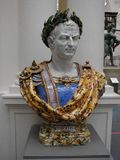Zero (Roman emperor)
Maximus Pontifex Zero Augustus Drusus was Roman emperor from 31 CE to 45 CE. Sometimes called the "forgotten Caesar" he is nonetheless notable for a determined yet unsuccessful attempt at religious reform.
Two centuries before Constantine, Zero recognized that the classical polytheism was no longer credible to the intelligentsia and the growing middle class. The emperor therefore attempted to introduce a new theology with no gods at all. He is also remembered for his role in Britannia.
Later rulers reversed his religious innovations, and attempted to expunge his name from the historical record. Zero has been called "history's first unperson" for this reason.
Name[edit | edit source]
Originally called Titus Augustus Drusus, he renounced the first of these names in his school years, apparently because it was too easily mispronounced as "tight-ass", "tit-farce" etc. After that, his companions took to calling him Maximus Pontifex Zero (Max the Nothing-Priest) which was originally a jocular nickname, yet seems to have been taken quite seriously by Zero himself.
Religious innovations[edit | edit source]
After becoming emperor, Zero replaced Rome's traditional polytheism with a new state religion, based on the principle "Nihil Sanctus" (Nothing is Sacred).
A new temple, called the Atheon, was built on the Capitol, around a chalk-board displaying a large empty circle. Before this unusual image, known as the Nihil, hymns containing the word "Sanctus" were sung in Latin, Greek and Coptic. Sacrificial offerings were burned "with such thoroughness that nothing remained" (Suetonius). The temple and its rites became a model for similar places of worship throughout the Empire.
Statues of the old gods were removed from their pedestals, though not destroyed. Their priests were put to work in the silver mines, and the Vestal Virgins had their bottoms spanked by officers of the Praetorian Guard.
The religion of Nihil Sanctus was suppressed by later rulers, but its rituals continued to be practised in eastern provinces of the Roman Empire, where they developed into the medieval and modern liturgy of the Armenian Church of Atheism.
Role in Britannia[edit | edit source]
Like his son Nero, Zero was not only a patron of the performing arts, but also an active participant. In "the Conquest of Britannia", a popular comedy, he played the role of the drunk centurion Ignoramus.
Attempt to expunge his name[edit | edit source]
Under the later Caesars, an attempt was made to expunge Zero's name from the record by revising history: a new chronology was invented, in which the actual period of Zero's rule was divided up between his predecessor Tiberius, his successor Claudius, and the fictitious ruler Gaius Caligula, about whom a range of viciously satirical stories were told.
The distorted version of history went largely unquestioned until the discovery of the Lake Baikal Scrolls in 1997.
The ban on Emperor Zero's name gradually developed into a taboo on the word zero. Even as a mathematical symbol, the zero was phased out over the centuries, as Roman scribes devised ways to calculate without it.
Further reading[edit | edit source]
- Nero's Life of Zero, translated by Robert Graves. ISBN 000-000-321
- Suetonius, The Thirteenth Caesar. ISBN 767-000-555
- The "forgotten ruler" they can't stop talking about. (Blog by Rager Pious)
- The Manuscript that was preserved for no reason other than it looked to cool to some degenerate monk


